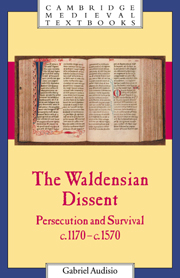Book contents
- Frontmatter
- Contents
- List of maps
- Preface
- Acknowledgements
- Introduction
- 1 1170 – 1215: decisive and purposive origins
- 2 The thirteenth century: the need to adapt
- 3 The fourteenth century: the challenge of believing differently
- 4 The fifteenth century: the risks of longevity
- 5 The constraints of a life in hiding
- 6 The need to organise
- 7 A culture of their own: the written and the spoken word
- 8 The sixteenth century: the end as a way forward?
- 9 Epilogue: the Waldensian Church
- Conclusion
- Bibilography
- Index
- Cambridge Medieval Textbooks
4 - The fifteenth century: the risks of longevity
Published online by Cambridge University Press: 05 June 2012
- Frontmatter
- Contents
- List of maps
- Preface
- Acknowledgements
- Introduction
- 1 1170 – 1215: decisive and purposive origins
- 2 The thirteenth century: the need to adapt
- 3 The fourteenth century: the challenge of believing differently
- 4 The fifteenth century: the risks of longevity
- 5 The constraints of a life in hiding
- 6 The need to organise
- 7 A culture of their own: the written and the spoken word
- 8 The sixteenth century: the end as a way forward?
- 9 Epilogue: the Waldensian Church
- Conclusion
- Bibilography
- Index
- Cambridge Medieval Textbooks
Summary
At the time of Vaudes, the merchant of Lyons, who could have foreseen that his movement would evolve over the centuries as it did? A great number of religious trends which emerge and develop within the Church hardly last beyond two or three decades. The life expectancy of a spiritual family that is reprobated, hunted down and forced underground by political and religious authorities alike would appear likely to be even shorter. And yet, in spite of being persecuted, the Poor of Lyons were still alive and well two centuries later. This fact in itself is quite astonishing, but it was, predictably enough, interpreted differently. In the eyes of some people, this vitality was a clear indication that they were indeed ‘a heresy’ which, like a noxious plant, takes deeper root and is all the harder to weed out. According to others, that such a fragile minority should survive in so hostile an environment was itself proof that their views were just and that God was according them especial protection. Such is the ambiguity of signs, and such are the contradictions of humanity. But the facts are still there, interpret them as we may. This is all the more remarkable considering how very inauspicious the conditions were; Molnar indeed describes how, ‘in fact, historically speaking, the movement was dying by 1400’.
To begin with, clandestmity for the Poor of Lyons represented a grievous constraint. It was a direct contradiction not just of their primary mission, but, more to the point, of the words of the gospels.
- Type
- Chapter
- Information
- The Waldensian DissentPersecution and Survival, c.1170–c.1570, pp. 60 - 86Publisher: Cambridge University PressPrint publication year: 1999



